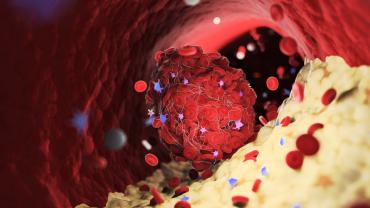
Nattokinase is a proteolytic enzyme found in natto, a Japanese fermented soy product known for its protective effects on the cardiovascular system. Proteolytic enzymes are a class of enzymes that break down proteins into individual amino acids. They are found in every system in the body and may help promote health throughout the body. Research suggests that nattokinase may help support the body’s ability to break down and remove damaged cellular debris and specific protein structures that are produced during the natural inflammatory process in response to trauma or injury.
Certain proteins related to cardiovascular health may be particularly influenced by nattokinase activity. Nattokinase has been shown to act in multiple pathways in the coagulation cascade and directly help degrade fibrin and dissolve thrombi. It may help inhibit plasminogen activator-inhibitor-1 and increase the activity of tissue plasminogen activator, helping to drive the conversion of plasminogen to plasmin and prourokinase to urokinase. It also helps support the inhibition of platelet aggregation by blocking thromboxane formation. Nattokinase has also been shown to help suppress intimal thickening of blood vessel walls through its support of antioxidative status and anti-apoptotic effects. It has also been shown to help support lipid metabolism through the inhibition of low-density lipoprotein oxidation and the reduction of lipid peroxidation.
A recently published study by Chen and colleagues explored the potential role of nattokinase in individuals with elevated lipid levels and atherosclerotic changes. This twelve-month clinical study involved 1,062 participants. At the end of the treatment period, the group that received 10,800 fibrin units (FUs) of nattokinase daily showed significant improvements in triglycerides (15.3%), low-density lipoprotein cholesterol (18.1%), and total cholesterol (15.9%). Significant reductions in common carotid artery-intima media thickness (CCA-IMT) and carotid plaque sizes were also observed. Synergistic effects were observed in the co-administration of vitamin K2 and nattokinase.
A subgroup of participants received 3,600 FUs of nattokinase daily. Nattokinase alone at this amount was not found to statistically improve lipid amounts or atherosclerotic progression. The study designers considered lifestyle factors in their statistical analysis. They observed greater improvements in lipid status and atherosclerotic changes in smokers and individuals who regularly consume alcohol. In addition, comparatively larger improvements in cardiovascular changes were observed in individuals who regularly exercised.
While more research is needed before clinical conclusions can be made, recent research indicates that nattokinase may help support cardiovascular health. It may also help promote healthy lipid metabolism and vascular function.
By Colleen Ambrose, ND, MAT